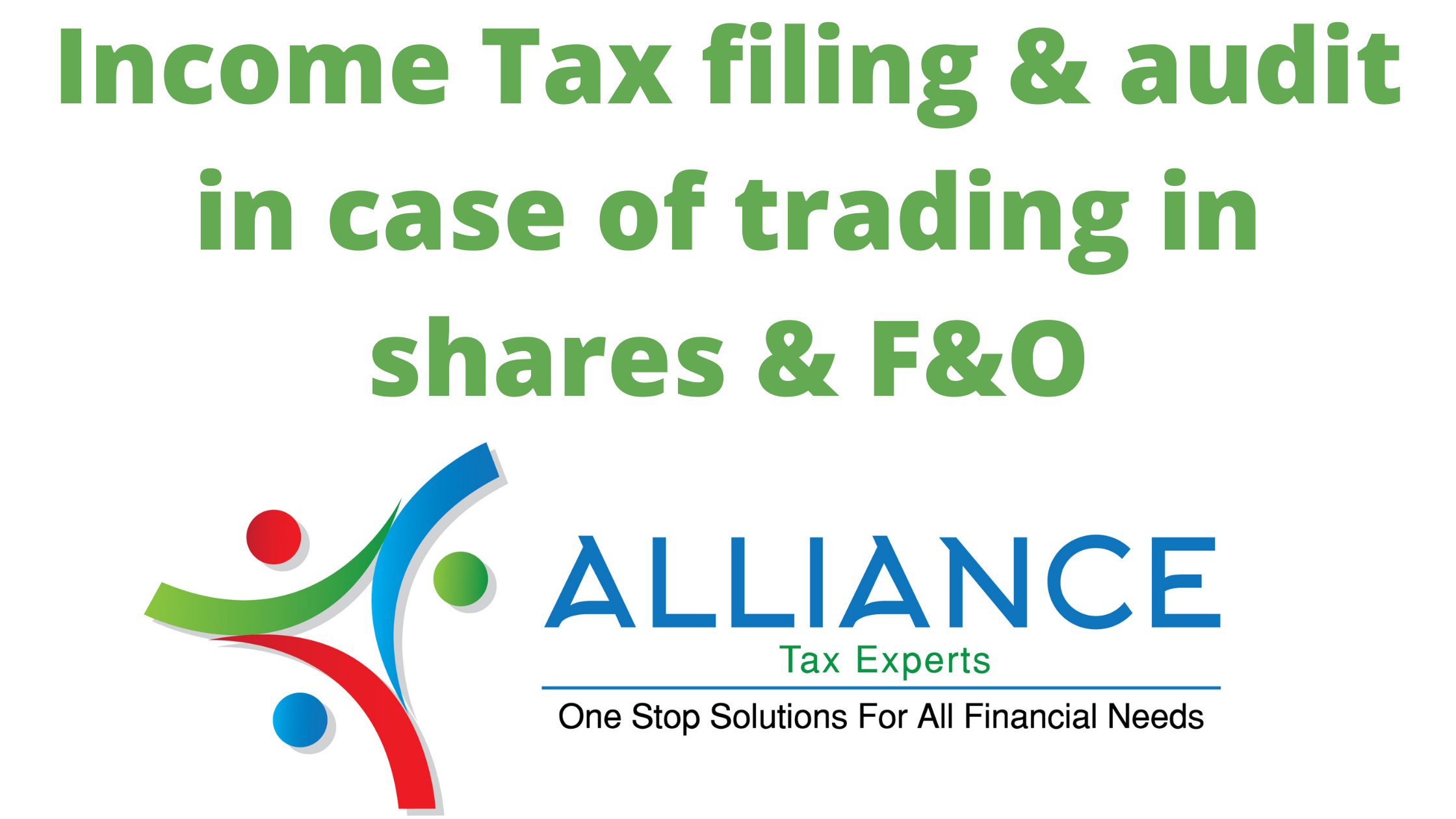
12 Oct
TURNOVER CALCULATION AND TAXABILITY OF FUTURES AND OPTIONS SIMPLIFIED
TURNOVER CALCULATION AND TAXABILITY OF FUTURES AND
OPTIONS - SIMPLIFIED
• 1. The formula for calculating turnover in F&O.
• 2. When is a tax audit required?
• 3. What will be your loss if the same is declared while filing the
return along with the tax audit report?
• 4. If the assessee is engaged in intraday equity trade and equity trade
where the holding period is more than 1 day.
• 5. Can we claim the cost of trading while filing the return?
• 6. Is digital signature token mandatory?
Futures and Options is a derivative tool designed to hedge a portfolio
but we are all aware that it has become one of the most traded tools for
regular profits. Therefore, income tax is aware of the above and future and
alternative income is taxable under general business income under the heading
‘Business and Business Income’ (PGBP).
India has become the largest market where options are bought according to
NSE data.
When you buy an option, especially when you sell an option, the value of
the transaction is very high so what should be considered as turnover is a
million-dollar question.
1. Formula for calculating turnover in F&O.
1. We need to download the P&L / Tax P&L summary from your
broker's website, in which we will be aware of P&L.
2. Copy and paste all profits/losses from the summary and remove the
minus sign in case of loss.
3. Your profit + loss (after removing the minus sign) will be your
turnover for the year.
For example, there are 4 transactions in a year in which profit and loss
are as follows -
Rs. 2,50,000, Rs. 7,50,000, Rs. -1,50,000 and Rs. -75,000.
Remove the above minus sign so that the turnover (Rs. 2,50,000 + Rs.
7,50,000 + Rs. 1,50,000 + Rs. 75,000) = Rs. 12,25,000.
2. When is a tax audit required?
Tax audit required in 2 cases -
1. In case of financial loss in F&O trading.
2. If your turnover is Rs. 5 crores in FY (from FY 2020-21). (After
fulfilling certain conditions.)
If any of the cases apply to you, you must have your books audited by a
chartered accountant in practice, otherwise, under Section 271B of the Income
Tax Act, a fine of Rs 1.5 lakh or 0.5% turnover may be levied. Compliance with
Section 44AB.
Also Rs. 25,000 can be charged under 271A for non-maintenance of books of
accounts.
3. What will be your loss if the same is declared
while filing the return along with the tax audit report?
You are entitled to unjust loss up to 8 A.Y. And can only be adjusted
from non-speculative income.
In the current year, it can be set from any head except salary and
speculative income and some other special business income.
4. If the assessee is engaged in intraday equity trade
and equity trade where the holding period is more than 1 day.
In the case mentioned above if the intraday is also continued (should be
a significant transaction) then the income/loss from above will be declared as
speculative income in "PGBP". Their losses are sent up to 4 A.Y. And
can only be set with speculative income. Tax audit is mandatory in the same way
as F&O in case of loss, tax audit is also mandatory in case of turnover of
more than Rs 5 crore (after fulfilling certain conditions), however, the
turnover calculation is different in the above cases. If the number of
transactions is limited to 10 throughout the year, it can also be added under
"Capital Gain".
If the equity is held for more than 1 day, it will be taxed under capital
gain and depending on the holding period it can be short term capital gain or
long term capital gain. A tax audit is not required in the event of short-term
or long-term capital loss from the sale of equity shares.
5. Can we claim the cost of trading while filing the
return?
Yes, you can claim the cost of brokerage, internet bill, turnover tax,
STT and other related charges. All you have to do is make sure the costs are
relevant and relevant to the business.
E.g. Internet bills, brokerage, stamp duty, STT, fines and penalties
levied by the exchange are some common expenses related to cash or F&O
trading.
6. Is a digital signature token mandatory?
If your books need to be audited by a chartered accountant, you must have
a digital signature token to upload the return and accept the tax audit form.
At least
a Class 3 signature DSC is required. If you have a higher version of DSC, it
will serve its purpose and can be used.
So, it's always advisable to check your turnover before income tax file
The author is Santosh Patil & he is CEO & Director @ Alliance Tax Experts.
Alliance
Tax Experts is a one-stop solution for all your Financial Needs. We are the
leading Income Tax, GST & Company registration services provider in Mumbai,
Navi Mumbai & all over Maharashtra, India.
We provide consultancy start from
Company Registrations, Income Tax Filing, Accounting, GST Filing, Income Tax
Audit, GST Audit services. We offer comprehensive compliances services for
proprietors, partnerships, Private limited companies, limited liability
partnerships, OPC private limited Companies, Trust and Individuals.
For any query
you may reach us on santoshpatil@alltaxfin.com or call on 9769201316
#incometax
#gst #taxconsultant #taxaudit #tax
#taxes #taxhelp #taxattorney #irs #taxdebt #taxrelief #gst #accountant
#taxplanning #incometax #charteredaccountant #taxresolution #tds
#taxpreparation #businessowner #taxlaw #irshelp #gstregistration #taxreturn
#taxlevy #mca #smallbusiness #selfemployed #taxliens #cpa #tcs #msme #bhfyp
#alliancetaxexperts